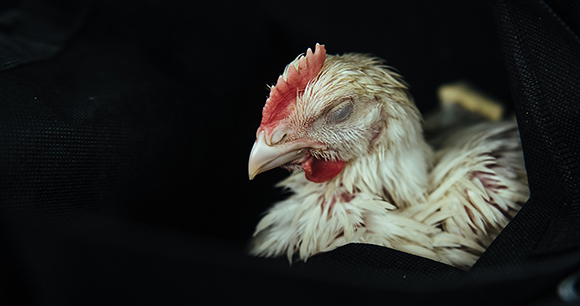
Washington, DC—In response to disease outbreaks and supply chain disruptions, US producers are killing an increasing number of farm animals by inducing heat stroke—“an urgent ethical problem for the US veterinary community,” according to a newly published paper in the journal Animals.
The American Veterinary Medical Association (AVMA) defines depopulation as “the rapid destruction of a population of animals in response to urgent circumstances.” One method used to kill large numbers of birds and pigs is “ventilation shutdown plus” (VSD+), which involves turning off the airflow in a barn and ratcheting up the temperature—sometimes as high as 170 degrees F—and leaving trapped animals to die from heat stroke.
During the avian influenza outbreak last year, more than 57 million birds being raised for meat or eggs were killed on farms, often by VSD+. Moreover, as African swine fever (ASF) continues to spread across the globe, there is concern producers will use VSD+ to depopulate ASF-infected pigs.
While expedient, heat stroke-based methods of killing animals “severely compromise animal welfare,” according to the journal article by Gwendolen Reyes-Illg, veterinary consultant for the farm animal program at the Animal Welfare Institute (AWI); Jessica E. Martin, associate professor in animal welfare and innovation at Newcastle University; Indu Mani, chief veterinary officer at Brief Media; James Reynolds, professor of large animal medicine and welfare at Western University of Health Sciences; and Barry Kipperman, instructor of veterinary ethics at the University of California, Davis.
Heat stroke-based depopulation methods can result in prolonged suffering and often do not achieve 100% mortality (the standard specified by the AVMA in its guidelines). Research suggests that VSD+ is painful for both pigs and poultry, and, at higher temperatures, may even cause burns in pigs.
The practice has generated significant controversy around the world. The World Organization of Animal Health does not condone depopulation methods relying on heat stroke. The United Kingdom considers VSD+ unacceptable, and the European Food Safety Authority advises against use of VSD+ for depopulating poultry and pigs on the grounds that it is likely “highly painful” for the animals.
Nevertheless, US producers are increasingly relying on VSD+, a method once considered a last resort. Many hog and poultry farms house thousands to hundreds of thousands of animals in each building, increasing their vulnerability in emergency situations. State records show that a poultry operation’s large size has been used to justify the use of VSD+ as a first-line depopulation method.
In 2019, the AVMA released depopulation guidelines classifying certain heat stroke-based killing methods as “permitted under constrained circumstances.” Since then, as the nation has grappled with the COVID-19 pandemic and the worst bird flu outbreak in US history, tens of millions of birds and pigs—including healthy animals—have been killed using some of the most inhumane methods available.
VSD+ was used alone or in combination with other methods in more than half of all depopulations during the first eight months of 2022, according to US Department of Agriculture records obtained by AWI. By comparison, VSD alone was used in only four of 224 commercial depopulations during the bird flu outbreak in 2016.
“The US veterinary profession is entrusted with an ethical responsibility to protect and advance animal welfare,” the paper’s authors said, “yet its classification of the heat stroke-based depopulation method Ventilation Shutdown Plus is used to justify this method’s widespread use.”
Though the AVMA guidelines are voluntary, the USDA typically relies on them when overseeing depopulations during animal disease outbreaks. The authors say that the AVMA should revise its guidelines and encourage the use of more humane methods when depopulations are performed. In the last two years alone, more than 1,500 veterinary professionals have petitioned the AVMA to classify all forms of ventilation shutdown as “not recommended.” To date, these efforts have been unsuccessful.
Recognizing that American consumers increasingly care about the treatment of animals in agriculture, federal lawmakers introduced bills in the last congressional session that seek to regulate depopulation, including the Transparency in Depopulation Act and the Industrial Agriculture Accountability Act. Such legislation would require industrial production facilities to file comprehensive disaster mitigation plans and would deny taxpayer-backed indemnity payments to producers using certain depopulation methods, including VSD+.
Marjorie Fishman, Animal Welfare Institute
[email protected], (202) 446-2128
The Animal Welfare Institute (awionline.org) is a nonprofit charitable organization founded in 1951 and dedicated to reducing animal suffering caused by people. AWI engages policymakers, scientists, industry, and the public to achieve better treatment of animals everywhere—in the laboratory, on the farm, in commerce, at home, and in the wild. Follow us on Facebook, Twitter, and Instagram for updates and other important animal protection news.